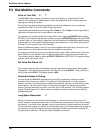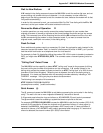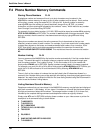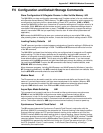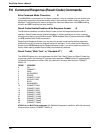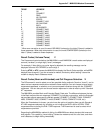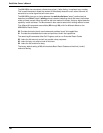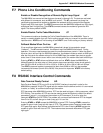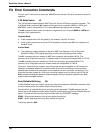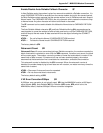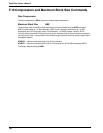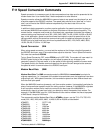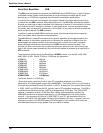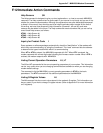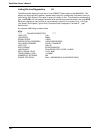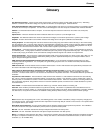
138
DataTalker Owner’s Manual
F.9 Error Correction Commands
You can use AT commands to place your MMH2834 one of three V.42 (error correction) modes of
operation.
V.42 Mode Select #L
The V.42 standard implements both MNP Class 3 & 4 and LAP-M error correction methods. The
V.42 Mode Select command (#L) selects which type of error correction (MNP or LAP-M) your
MMH2834 uses for transmissions. The various #L command options are as follows.
The #L0 command allows a pair of modems to negotiate which V.42 mode (MNP or LAP-M) will
be used in their transmissions.
Originate Mode
a. If both modems have LAP-M capability, the modems use LAP-M mode.
b. If one or both modems do not have LAP-M capability and both have MNP, the modems use
the MNP mode.
Answer Mode
a. The answering modem responds to either an MNP Link Request or LAP-M Originator
Detection Pattern (ODP) signal depending on which the originating modem issues.
The #L1 command sets your modem to MNP error correction and disables LAP-M. This
command is for Originate mode only. In Answer mode, the modem still accepts MNP or LAP-M.
The #L2 command sets your modem to LAP-M error correction, and disables MNP. This
command is for Originate mode only. Answer mode still accepts MNP or LAP-M.
In the prior commands, the modems use a two phase process to establish a V.42 connection
(detection to establish whether the remote modem is also error correcting, and then protocol
establishment to determine parameters and to establish the error correction connection). If you
know that the other modem is a V.42 error correcting modem, and you wish to use LAP-M, the
#L3 command disables the detection phase and goes directly to protocol establishment. Both
modems must have #L3 in effect.
Auto-Reliable Buffering $A
In Auto-Reliable mode, the modem is given four seconds to establish a Reliable connection. After
this four-second period, the modem drops to Normal mode.
Any data which is received during this period is typically discarded. The $A command can be
used to cause the modem to buffer (save) data that is received during this Auto-Reliable time-out
period. This data will then be output by the modem after the CONNECT message.
AT$A0 = Discard data received during auto-reliable time period.
AT$A1 = Buffer data received during auto-reliable time period.
The factory default is $A0.



